新人教版八年级英语上册unit3知识点总结说课讲解
- 格式:doc
- 大小:75.50 KB
- 文档页数:7
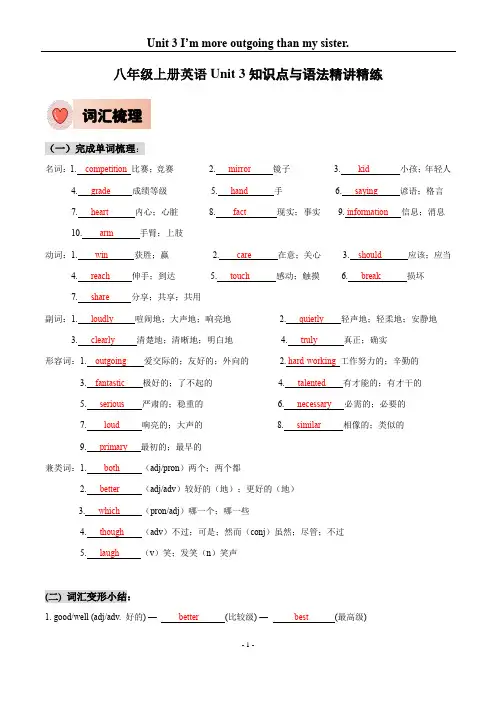
八年级上册英语Unit 3知识点与语法精讲精练词汇梳理(一)完成单词梳理:名词:1. competition比赛;竞赛 2. mirror 镜子 3. kid 小孩;年轻人4. grade 成绩等级5. hand 手6. saying 谚语;格言7. heart 内心;心脏8. fact 现实;事实9. information 信息;消息10. arm 手臂;上肢动词:1. win 获胜;赢 2. care 在意;关心 3. should 应该;应当4. reach 伸手;到达5. touch 感动;触摸6. break 损坏7. share 分享;共享;共用副词:1. loudly 喧闹地;大声地;响亮地 2. quietly 轻声地;轻柔地;安静地3. clearly 清楚地;清晰地;明白地4. truly 真正;确实形容词:1. outgoing 爱交际的;友好的;外向的 2. hard-working工作努力的;辛勤的3. fantastic 极好的;了不起的4. talented 有才能的;有才干的5. serious 严肃的;稳重的6. necessary 必需的;必要的7. loud 响亮的;大声的8. similar 相像的;类似的9. primary 最初的;最早的兼类词:1. both (adj/pron)两个;两个都2. better (adj/adv)较好的(地);更好的(地)3. which (pron/adj)哪一个;哪一些4. though (adv)不过;可是;然而(conj)虽然;尽管;不过5. laugh (v)笑;发笑(n)笑声(二) 词汇变形小结:1. good/well (adj/adv. 好的) — better (比较级) — best (最高级)2. loud (adj. 大声的) — loudly (adv.喧闹地)3. quiet (adj. 安静的) — quietly (adv. 安静地)4. competition (n. 竞争;比赛) — compete (v. 竞争;比赛)5. clearly (adv. 清楚地;清晰地) — clear (adj. 清楚的;清晰的)6. win (v. 赢;获胜) — won (过去式) — winner (n. 获胜者)7. talented (adj. 有才能的) — talent (n. 才能;天赋)8. truly(adv. 真正;确实) — true (adj. 真正的) — truth (n. 真实;真相)9. care(v. 在意;关心) — careful (adj. 认真的;细心的)10. serious(adj. 严肃的;稳重的) — seriously (adv. 严重地;严肃地)11. say(v. 说) — saying (n. 谚语;格言)12. touch(v. 感动;触摸) — touching (adj. 令人感动的) — touched (adj. 感动的)13. break(v. 破坏) — broke (过去式)【练一练】用所给词的适当形式填空1.Class Six won (win) the basketball game but our class lost the game.2.My friend likes telling jokes. He often makes us laugh (laugh)happily.3.Be quiet (quietly)! I have something important to tell you.4.I think Linda dances better (well) than Kate.5.Students can’t speak loudly (loud) in the library.6.Although he is only two years old, he can speak clearly (clear).7.The teacher told us to find out some information (information)about our country and share it next week.8.I’m truly (true) sorry that things had to end like this.st night we saw a movie and it made us touched (touch).10.I don't think differences (different) are important in a friendship.(三) 短语攻关:care about关心;在意be talented in 在……有天赋both...and...……和……都play the drums 敲鼓the singing competition 歌唱比赛be similar to 与……相像的bring out 使显现the same as 和……相同be different from与……不同as long as 只要in fact 事实上primary school 小学get good grades 取得好成绩have fun doing sth 做某事很开心make sb do sth 让某人做某事want to do sth 想要做某事make friends 交朋友be like 像……一样知识点梳理1.Both Sam and Tom can play the drums, but Sam plays them better than Tom. 萨姆和汤姆都会敲鼓,但是萨姆比汤姆敲得好。
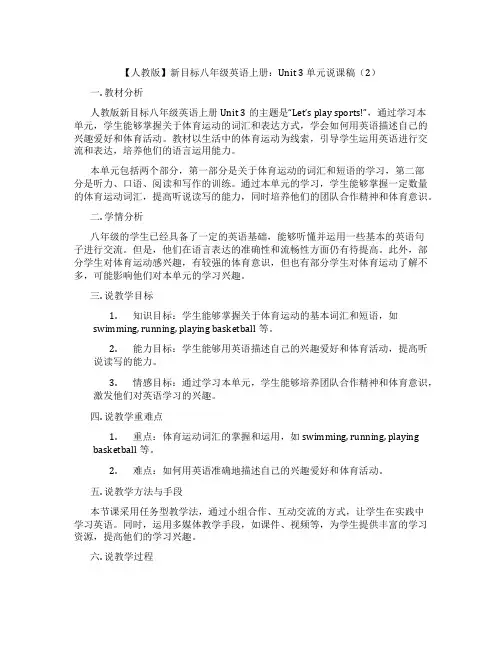
【人教版】新目标八年级英语上册:Unit 3 单元说课稿(2)一. 教材分析人教版新目标八年级英语上册Unit 3的主题是“Let’s play sports!”,通过学习本单元,学生能够掌握关于体育运动的词汇和表达方式,学会如何用英语描述自己的兴趣爱好和体育活动。
教材以生活中的体育运动为线索,引导学生运用英语进行交流和表达,培养他们的语言运用能力。
本单元包括两个部分,第一部分是关于体育运动的词汇和短语的学习,第二部分是听力、口语、阅读和写作的训练。
通过本单元的学习,学生能够掌握一定数量的体育运动词汇,提高听说读写的能力,同时培养他们的团队合作精神和体育意识。
二. 学情分析八年级的学生已经具备了一定的英语基础,能够听懂并运用一些基本的英语句子进行交流。
但是,他们在语言表达的准确性和流畅性方面仍有待提高。
此外,部分学生对体育运动感兴趣,有较强的体育意识,但也有部分学生对体育运动了解不多,可能影响他们对本单元的学习兴趣。
三. 说教学目标1.知识目标:学生能够掌握关于体育运动的基本词汇和短语,如swimming, running, playing basketball等。
2.能力目标:学生能够用英语描述自己的兴趣爱好和体育活动,提高听说读写的能力。
3.情感目标:通过学习本单元,学生能够培养团队合作精神和体育意识,激发他们对英语学习的兴趣。
四. 说教学重难点1.重点:体育运动词汇的掌握和运用,如swimming, running, playingbasketball等。
2.难点:如何用英语准确地描述自己的兴趣爱好和体育活动。
五. 说教学方法与手段本节课采用任务型教学法,通过小组合作、互动交流的方式,让学生在实践中学习英语。
同时,运用多媒体教学手段,如课件、视频等,为学生提供丰富的学习资源,提高他们的学习兴趣。
六. 说教学过程1.热身(5分钟):引导学生进行简单的体育活动,如跑步、跳绳等,激发学生的体育兴趣。
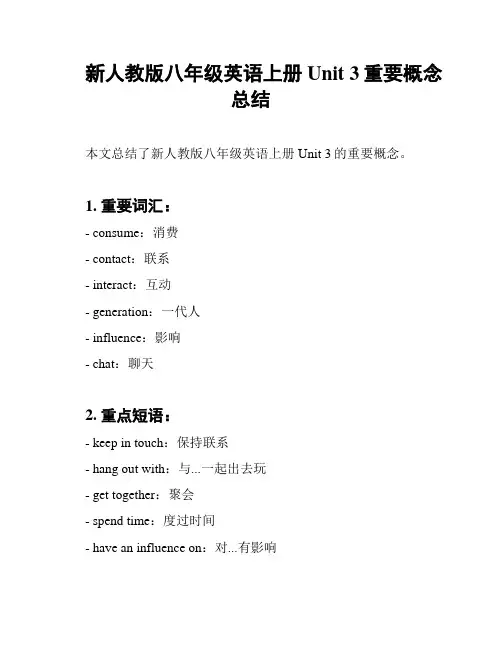
新人教版八年级英语上册Unit 3重要概念
总结
本文总结了新人教版八年级英语上册Unit 3的重要概念。
1. 重要词汇:
- consume:消费
- contact:联系
- interact:互动
- generation:一代人
- influence:影响
- chat:聊天
2. 重点短语:
- keep in touch:保持联系
- hang out with:与...一起出去玩
- get together:聚会
- spend time:度过时间
- have an influence on:对...有影响
3. 重要句式:
- I usually spend my weekends playing sports with my friends.(我
通常在周末和朋友们一起打运动。
)
- How often do you spend time with your family?(你多久和你的
家人在一起?)
- Social media has a great influence on young people.(社交媒体
对年轻人有很大的影响。
)
4. 重要语法点:
- 现在进行时:表示现在正在进行的动作。
- 一般现在时:表示经常发生的动作、存在的状态或普遍真理。
5. 重要知识点:
- 本单元主要研究了与互动、交流和影响相关的词汇和短语,
以及描述日常活动的现在进行时和一般现在时。
以上是新人教版八年级英语上册Unit 3的重要概念总结。
参考资料:《新人教版八年级英语上册》。
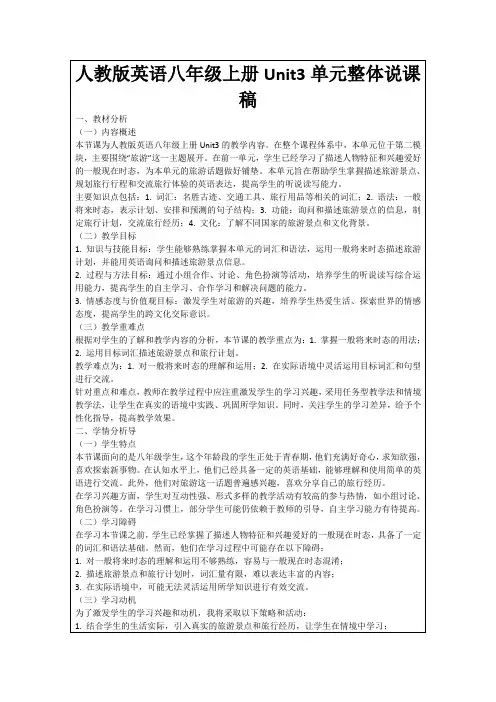
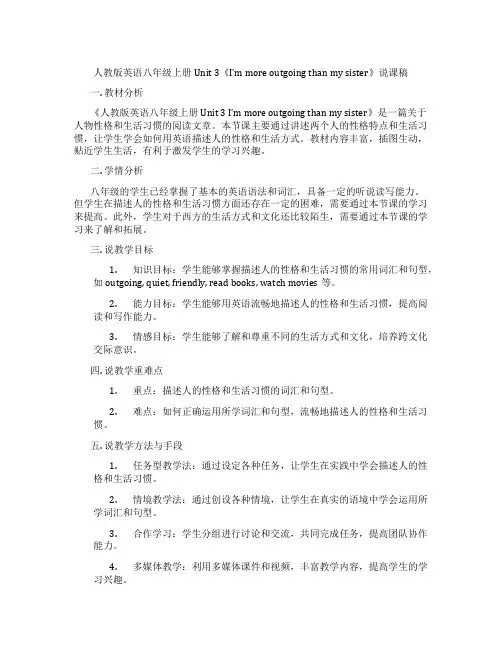
人教版英语八年级上册Unit 3《I’m more outgoing than my sister》说课稿一. 教材分析《人教版英语八年级上册Unit 3 I’m more outgoing than my sister》是一篇关于人物性格和生活习惯的阅读文章。
本节课主要通过讲述两个人的性格特点和生活习惯,让学生学会如何用英语描述人的性格和生活方式。
教材内容丰富,插图生动,贴近学生生活,有利于激发学生的学习兴趣。
二. 学情分析八年级的学生已经掌握了基本的英语语法和词汇,具备一定的听说读写能力。
但学生在描述人的性格和生活习惯方面还存在一定的困难,需要通过本节课的学习来提高。
此外,学生对于西方的生活方式和文化还比较陌生,需要通过本节课的学习来了解和拓展。
三. 说教学目标1.知识目标:学生能够掌握描述人的性格和生活习惯的常用词汇和句型,如 outgoing, quiet, friendly, read books, watch movies等。
2.能力目标:学生能够用英语流畅地描述人的性格和生活习惯,提高阅读和写作能力。
3.情感目标:学生能够了解和尊重不同的生活方式和文化,培养跨文化交际意识。
四. 说教学重难点1.重点:描述人的性格和生活习惯的词汇和句型。
2.难点:如何正确运用所学词汇和句型,流畅地描述人的性格和生活习惯。
五. 说教学方法与手段1.任务型教学法:通过设定各种任务,让学生在实践中学会描述人的性格和生活习惯。
2.情境教学法:通过创设各种情境,让学生在真实的语境中学会运用所学词汇和句型。
3.合作学习:学生分组进行讨论和交流,共同完成任务,提高团队协作能力。
4.多媒体教学:利用多媒体课件和视频,丰富教学内容,提高学生的学习兴趣。
六. 说教学过程1.导入:通过展示两张人物图片,让学生猜测他们的性格和生活习惯,激发学生的学习兴趣。
2.读前活动:让学生预览文章标题和插图,预测文章内容,激发学生的阅读欲望。
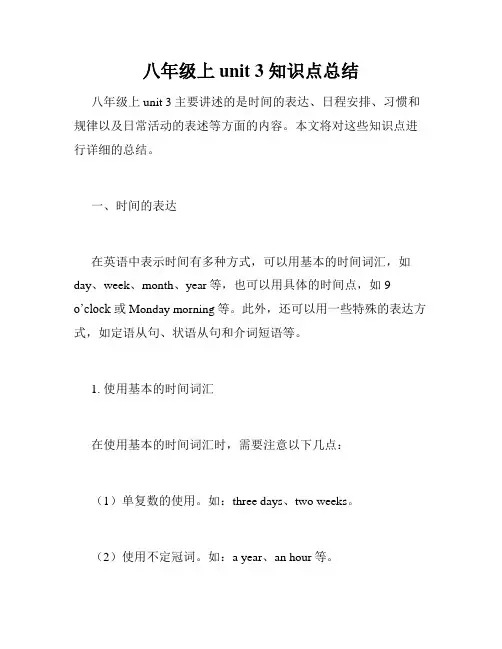
八年级上unit 3 知识点总结八年级上unit 3主要讲述的是时间的表达、日程安排、习惯和规律以及日常活动的表述等方面的内容。
本文将对这些知识点进行详细的总结。
一、时间的表达在英语中表示时间有多种方式,可以用基本的时间词汇,如day、week、month、year等,也可以用具体的时间点,如9o’clock 或 Monday morning等。
此外,还可以用一些特殊的表达方式,如定语从句、状语从句和介词短语等。
1. 使用基本的时间词汇在使用基本的时间词汇时,需要注意以下几点:(1)单复数的使用。
如:three days、two weeks。
(2)使用不定冠词。
如:a year、an hour等。
(3)表示“在(某一个)时间之前”用介词“before”,表示“在(某一个)时间之后”用介词“after”。
如:before 7 o’clock、after Monday。
2. 使用具体的时间点在使用具体的时间点时,需要注意以下几点:(1)使用正确的时间短语。
如:in the morning、in the evening、in the afternoon等。
(2)使用正确的介词。
如:at、in、on等。
如:at 9 o’clock、in May。
(3)表示星期几时需要使用大写字母。
如:Today is Monday.3. 特殊的时间表达方式(1)定语从句。
如:The day when I met him was a memorable day.(2)状语从句。
如:As soon as I finish my homework, I will go to bed.(3)介词短语。
如:on the way、at the moment、in the middle of等。
二、日程安排在日程安排方面,需要掌握一些基本的时间表达方式,如:(1)What’s your plan for tomorrow?(你明天有什么计划?)(2)What are you going to do this afternoon?(你下午要干什么?)(3)I’ll be busy tomorrow.(我明天会很忙。
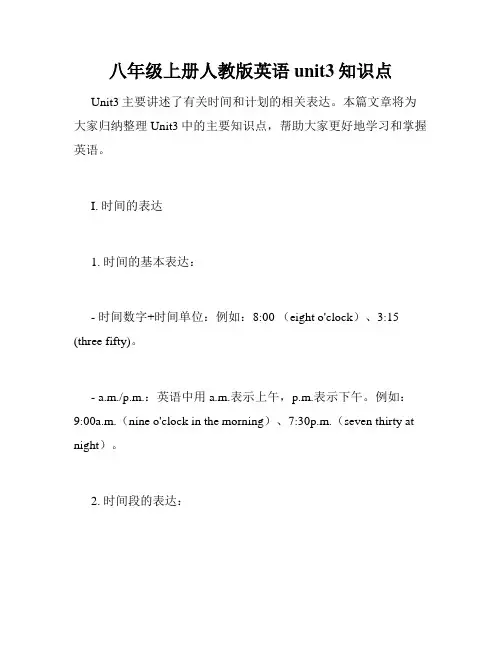
八年级上册人教版英语unit3知识点Unit3主要讲述了有关时间和计划的相关表达。
本篇文章将为大家归纳整理Unit3中的主要知识点,帮助大家更好地学习和掌握英语。
I. 时间的表达1. 时间的基本表达:- 时间数字+时间单位:例如:8:00 (eight o'clock)、3:15 (three fifty)。
- a.m./p.m.:英语中用a.m.表示上午,p.m.表示下午。
例如:9:00a.m.(nine o'clock in the morning)、7:30p.m.(seven thirty at night)。
2. 时间段的表达:- 表示时间段的连词有:from…to/ between…and/ from…till/ between…and/ from… until等,例如:from 9:00 to 11:00/ between 1:00 and 3:00/ from Monday to Friday。
- 时间段的表达还可以用“… past…” 和“to…”来表示时间段的前后两个端点,例如:It's twenty-five past nine。
It's a quarter to ten。
3. 时间表达中常用的词汇:- minute(分钟)/hour(小时)/day(天)/week(周)/month (月)/year(年)- date(日期)/weekend(周末)/weekday(工作日)/holiday(假期)/vacation(假期)II. 计划的表达1. 表示计划的常用句型:- What are you going to do…? 你打算做什么?- I'm going to… 我打算……- I'm not going to… 我不打算……- What's your plan for…? 你什么时候做什么?- My plan for… is… 我计划在……做……2. 常见的时间状语和频率副词:- tomorrow(明天)/next Monday(下周一)/next month(下个月)/next year(明年)- once a week(每周一次)/twice a month(每月两次)/three times a year(每年三次)- on weekends(在周末)/in the evening(在晚上)/in the morning(在早上)- every day(每天)/always(总是)/sometimes(有时)/never (从不)III. 阳历和阴历的表达1. 阳历的表达:阳历是指以地球绕太阳运行一周为一年的历法,一般是指公历。
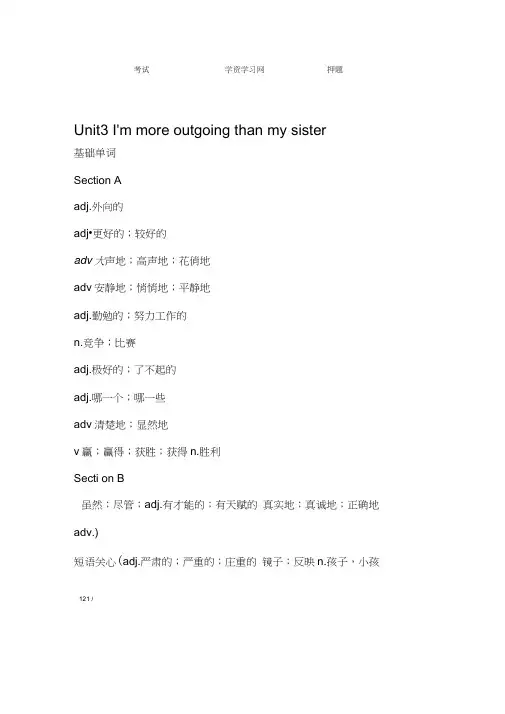
Unit3 I'm more outgoing than my sister基础单词Section Aadj.外向的adj•更好的;较好的adv大声地;高声地;花俏地adv安静地;悄悄地;平静地adj.勤勉的;努力工作的n.竞争;比赛adj.极好的;了不起的adj.哪一个;哪一些adv清楚地;显然地v赢;赢得;获胜;获得n.胜利Secti on B虽然;尽管;adj.有才能的;有天赋的真实地;真诚地;正确地adv.)短语关心(adj.严肃的;严重的;庄重的镜子;反映n.孩子,小孩121 /n. 121 /只要(短语)adj.必要的;必然的和...不同(短语)adj.两者都pron.两者拿出;推出(短语)n. 成绩应该;可能;应当;将要与...同样的(短语)n. 名言v.到达;伸出;达成;n援手vt.触摸;感动n.心脏;内心事实上;实际上;确切地说(短语)v打碎;折断;违背;解决;中断n. 胳膊v.笑;嘲笑n.笑声;笑料vt .分享,共享;分配;共有adj.大声的;adv大声地;响亮地________ 类似于;与…相似(短语)小学(短语)2 / 12n.信息;情报;资料;通知 _______________重要短语Section Aboth A and B A 和B 都…both of…两者都…play the drums 敲鼓more outgoing 更外向/更开朗,as+形容词/副词+as… 与........ 一样,not as/so+形容词/副词+as 不如the most important 最重要的something new 一些新的东西have fun doing sth. 过得愉快get up 起床work hard 努力工作;学习run fast 跑得快Section B1. be tale nted in …在……方面有天赋2. the same as 与……相同3.(truly) care about(真正)关心/留意/关注4. make sb. do sth. 使某人笑5. be different from 与…不同3 / 126. make friends with sb. 与某人交朋友7. as long as 只要;与 ---- 样长8. bring out 拿出;推出9. in fact 事实上;实际10. primary school 小学12. get better grades 取得好成绩,13. reach for 伸手达到/ 达到14. touch one's heart 感动,17. be good at 在某方面成绩好,18. the other 另一个,19. be similar to 与…相似,20. be good with与…和睦相处21. be like a mirror 像一面镜子22. be friendly with sb. 对某人很友好23. It's+ adj.+for sb. to do sth.对某人来说,做某事...... 的。
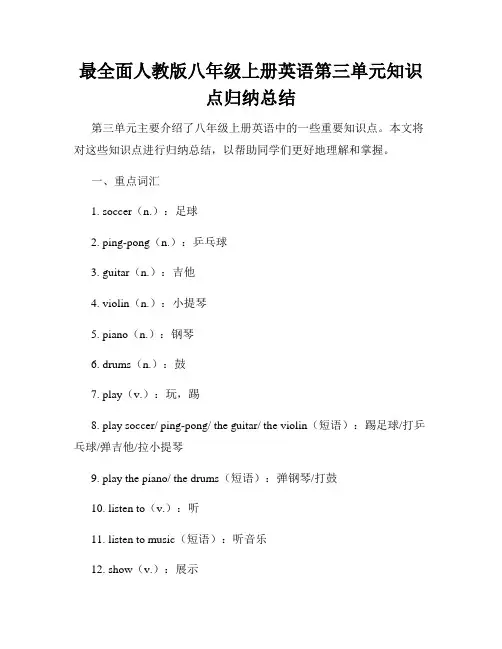
最全面人教版八年级上册英语第三单元知识点归纳总结第三单元主要介绍了八年级上册英语中的一些重要知识点。
本文将对这些知识点进行归纳总结,以帮助同学们更好地理解和掌握。
一、重点词汇1. soccer(n.):足球2. ping-pong(n.):乒乓球3. guitar(n.):吉他4. violin(n.):小提琴5. piano(n.):钢琴6. drums(n.):鼓7. play(v.):玩,踢8. play soccer/ ping-pong/ the guitar/ the violin(短语):踢足球/打乒乓球/弹吉他/拉小提琴9. play the piano/ the drums(短语):弹钢琴/打鼓10. listen to(v.):听11. listen to music(短语):听音乐12. show(v.):展示13. show sb. sth.(短语):展示给某人某物14. music(n.):音乐15. musician(n.):音乐家16. concert(n.):音乐会17. kind(adj.):友好的,和蔼的18. polite(adj.):有礼貌的,客气的19. patient(adj.):有耐心的20. helpful(adj.):乐于助人的二、重点句型1. What can you do?(你会做什么?)- I can play soccer/ ping-pong/ the guitar/ the violin/ the piano/ the drums.(我会踢足球/打乒乓球/弹吉他/拉小提琴/弹钢琴/打鼓。
)2. Can you play the piano?(你会弹钢琴吗?)- Yes, I can. / No, I can't.(是的,我会。
/不,我不会。
)3. Who can play the drums?(谁会打鼓?)- Li Lei can play the drums.(李雷会打鼓。
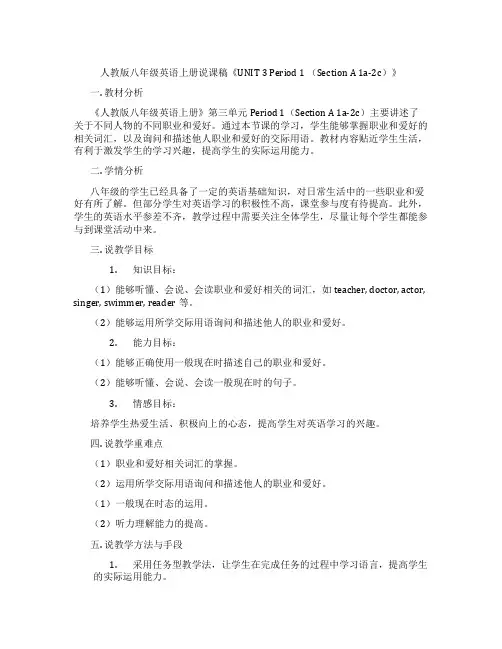
人教版八年级英语上册说课稿《UNIT 3 Period 1 (Section A 1a-2c)》一. 教材分析《人教版八年级英语上册》第三单元Period 1(Section A 1a-2c)主要讲述了关于不同人物的不同职业和爱好。
通过本节课的学习,学生能够掌握职业和爱好的相关词汇,以及询问和描述他人职业和爱好的交际用语。
教材内容贴近学生生活,有利于激发学生的学习兴趣,提高学生的实际运用能力。
二. 学情分析八年级的学生已经具备了一定的英语基础知识,对日常生活中的一些职业和爱好有所了解。
但部分学生对英语学习的积极性不高,课堂参与度有待提高。
此外,学生的英语水平参差不齐,教学过程中需要关注全体学生,尽量让每个学生都能参与到课堂活动中来。
三. 说教学目标1.知识目标:(1)能够听懂、会说、会读职业和爱好相关的词汇,如teacher, doctor, actor, singer, swimmer, reader等。
(2)能够运用所学交际用语询问和描述他人的职业和爱好。
2.能力目标:(1)能够正确使用一般现在时描述自己的职业和爱好。
(2)能够听懂、会说、会读一般现在时的句子。
3.情感目标:培养学生热爱生活、积极向上的心态,提高学生对英语学习的兴趣。
四. 说教学重难点(1)职业和爱好相关词汇的掌握。
(2)运用所学交际用语询问和描述他人的职业和爱好。
(1)一般现在时态的运用。
(2)听力理解能力的提高。
五. 说教学方法与手段1.采用任务型教学法,让学生在完成任务的过程中学习语言,提高学生的实际运用能力。
2.运用多媒体教学手段,如图片、视频等,丰富教学内容,激发学生的学习兴趣。
3.采用分组合作学习,提高学生的团队协作能力,使课堂更加生动有趣。
4.注重个体差异,因材施教,让每个学生都能在课堂上得到锻炼和提高。
六. 说教学过程利用图片展示不同职业的人物,引导学生谈论他们的职业,为新课的学习做好铺垫。
2.新课呈现:(1)展示1a图片,让学生观察并说出图中人物的职业。
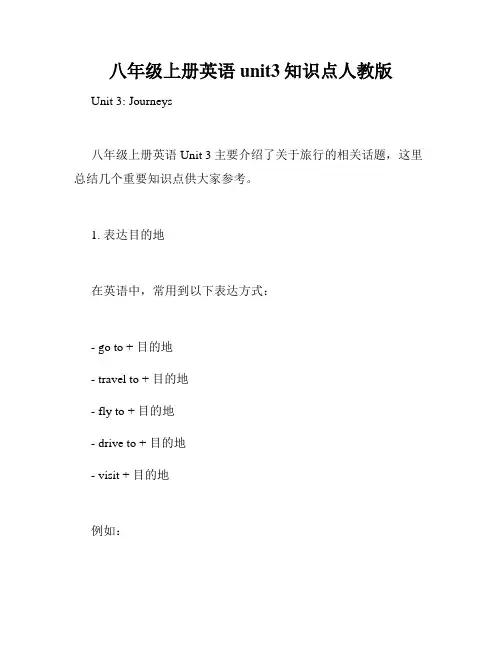
八年级上册英语unit3知识点人教版Unit 3: Journeys八年级上册英语Unit 3主要介绍了关于旅行的相关话题,这里总结几个重要知识点供大家参考。
1. 表达目的地在英语中,常用到以下表达方式:- go to + 目的地- travel to + 目的地- fly to + 目的地- drive to + 目的地- visit + 目的地例如:- We're going to Paris for vacation next week.- She has traveled to many countries in Asia.- They flew to New York for a business trip last month.- My parents drove to the countryside for a weekend getaway. - We visited the Great Wall during our trip to China.2. 询问和表达时间在英语中,常用到以下表达方式:- What time is it? (现在几点了?)- What time do you usually...? (你通常几点...)- At + 具体时间点(表示某一时刻)- In + 时间段(表示一个时间段)例如:- A: What time is it now?B: It's 2:30 pm.- A: What time do you usually get up?B: I usually get up at 7:00 am.- It's 8:00 am now.- In the morning/afternoon/evening/weekend...3. 表达交通工具在英语中,常用到以下表达方式:- take a plane/bus/train/taxi/subway...- ride a bike/horse/motorcycle...- drive/ride in a car...例如:- We took a train to Shanghai last summer.- She rides a bike to school every day.- My father drives a car to work.- They took a taxi to the airport.4. 询问和表达位置在英语中,常用到以下表达方式:- Where is...?(...在哪里?)- How can I get to...?(我怎样才能到达...?)- It's near/far from...(它离...近/远)- It's on the left/right/in front of/behind...(它在...的左/右/前/后)例如:- A: Where is the nearest hospital?B: It's just around the corner.- A: How can I get to the museum?B: You can take the subway to the nearest station and then walk there.- It's far from here.- The supermarket is on the left of the park.总之,学好旅行话题的相关知识点,可以在旅行中更加自如地交流和应对各种情况。
人教版八年级上Unit 3 I'm more outgoing than my sister.知识点归纳一、短语归纳1.more outgoing更外向2.both…and…两者都3.more loudly 更大声地4.be different from与……不同5.look similar 看起来相似6.in what ways 在哪些方面7.run faster 跑地更快8.jump higher 跳地更高9.work harder 学习地更努力10.as…as…与……一样……11. not so/as…as 和…不一样,不如12. the singing petition唱歌比赛13. the most important thing 最重要的事情14. be similar to与……相像的 /类似的15. the same as和……相同;与……一致16. be talented in 在某方面有天赋17. care about 关心;介意18. make sb do sth. 使某人做某事19. be like a mirror 像一面镜子20. that’s why 那就是…原因21. as long as只要;既然22. bring out 使显现;使表现出23. get better grades取得更好的成绩24. reach for 伸手取25. touch one’s heart 碰触/感动某人的心灵26. in fact事实上;实际上27. break one’s arm 手臂受伤28. feel better 感觉好得多29. primary school 小学30. be good at擅长……31. be good with 善于与……相处32. be important to对某人来说重要33. pretty outgoing 相当外向二、重点句式1.I am more outgoing than my sister.2.Sam has longer hair than Tom.3.Sam plays them better than Tom.4.That’s Tara, isn’t it?5.Tara works as hard as Tina.6.Which one was Lisa?7.The most important thing is to learn something new and have fun.8.Who is smarter, your mother or your father?9.A good friend is talented in music.10.A good friend likes to do the same things as me.11.Mary and her best friend are both tall.12.A good friend is like a mirror.13.That’s why I like reading books and I study hard in class.14.It’s not easy for me to make friends.15.You don’t need a lot of friends as long as they are good.16.I don’t really care if my friends are the same as me or different.17.A true friend reaches for your hand and touches your heart.三、知识点归纳1.比较级:比较级就是将二者进行比较产生的词形,是由形容词或副词原级转化而来,一般是在原级后面加er构成:1).单音节形容词和部分双音节词,一般在词尾加er。
人教版八年级英语上册说课稿《UNIT 3 Period 3 (Section B 1a-1e)》一. 教材分析《人教版八年级英语上册》第三单元第三课时,主要内容为Section B 1a-1e。
本节课的主要话题是关于不同国家的节日,通过对比中西方节日的不同,让学生了解和尊重不同的文化背景。
教材内容丰富,既有读写任务,又有听力练习,还有口语交流,能够全面提高学生的英语综合运用能力。
二. 学情分析八年级的学生已经具备一定的英语基础,对于日常生活中的话题能够进行简单的交流。
但是,对于一些特定的文化背景知识,可能还不够了解。
因此,在教学过程中,教师需要帮助学生建立起文化背景知识与语言技能之间的联系。
三. 说教学目标1.知识目标:学生能够掌握关于节日的词汇和表达方式,了解中西方节日的不同。
2.能力目标:学生能够听懂、说清、读准关于节日的对话,能够运用所学知识进行简单的交流。
3.情感目标:培养学生尊重和了解不同文化的态度。
四. 说教学重难点1.重点:学生能够掌握关于节日的词汇和表达方式,能够进行简单的交流。
2.难点:学生能够理解并运用语法结构“how special/ important/interesting”进行表达。
五. 说教学方法与手段本节课采用任务型教学法,通过设置各种任务,引导学生主动参与学习过程。
同时,运用多媒体教学手段,如图片、视频等,帮助学生更好地理解和掌握知识。
六. 说教学过程1.导入:教师通过展示中西方节日的图片,引导学生谈论各自喜欢的节日,激发学生的学习兴趣。
2.新课呈现:教师通过播放视频,介绍中国的春节和西方的圣诞节,让学生了解两者的不同。
3.课堂活动:学生分组进行角色扮演,模拟中外朋友谈论节日的场景。
4.听力练习:学生听录音,完成相关的练习题。
5.口语练习:学生运用所学知识,进行小组讨论。
6.总结:教师引导学生总结本节课所学内容,强调尊重和了解不同文化的态度。
七. 说板书设计板书设计简洁明了,主要包括课题、教学内容和关键词。
八年级英语上册-人教版-Unit 3 说课稿(2)一. 教材分析人教版八年级英语上册Unit 3的主题是“How do you get to school?”,主要让学生掌握一般疑问句的构成及其回答方式,同时学习与日常生活相关的交通工具和地点的词汇。
通过对教材的分析,我们可以发现,本单元的教学内容紧密联系学生的实际生活,有利于激发学生的学习兴趣和积极性。
二. 学情分析根据我对学生的了解,他们在七年级已经学习了简单的日常英语交际,对本单元的主题有一定的认识。
但部分学生对一般疑问句的构成和回答方式还不够熟练,同时他们的词汇量和语法知识也需要进一步拓展。
因此,在教学过程中,我需要关注学生的个体差异,因材施教。
三. 说教学目标1.知识目标:让学生掌握一般疑问句的构成及其回答方式,学会使用本课中的交通工具和地点词汇进行日常英语交际。
2.能力目标:培养学生用英语询问和描述日常生活中的地点和交通方式的能力。
3.情感目标:激发学生学习英语的兴趣,培养他们积极向上的学习态度。
四. 说教学重难点1.重点:一般疑问句的构成及其回答方式,本课中的交通工具和地点词汇。
2.难点:一般疑问句在实际交际中的应用,以及词汇和语法知识的拓展。
五. 说教学方法与手段1.教学方法:采用任务型教学法,让学生在完成实际任务的过程中学习和运用英语。
2.教学手段:利用多媒体课件、图片、地图等教学资源,以及课堂互动、小组讨论等教学活动。
六. 说教学过程1.导入:以学生日常上学交通工具为主题,引导学生谈论各自的交通方式,为新课学习做好铺垫。
2.呈现:通过展示一张学校的地图,引导学生找出学校附近的交通地点,同时板书关键词汇。
3.practice:让学生两人一组,用一般疑问句询问对方的交通方式,并回答。
4.扩展:通过小组讨论,让学生思考其他可能的交通方式,丰富词汇和语法知识。
5.巩固:设计一个角色扮演活动,让学生模拟在机场或车站询问和描述交通方式的情景。
八年级英语上册-人教版-Unit 3 说课稿(1)一. 教材分析人教版八年级英语上册Unit 3的主题是“My hero”,通过介绍英雄人物,让学生学会表达人物的特征、外貌、喜好等。
本单元的词汇和句子结构较为复杂,学生需要掌握一些形容词和副词来描述人物。
此外,本单元还涉及到了过去进行时态的用法。
二. 学情分析八年级的学生已经掌握了英语学习的基本语法和词汇,但部分学生在口语表达和写作方面还存在困难。
针对这一情况,教师在教学过程中要注重培养学生的口语表达能力和写作能力,同时激发学生的学习兴趣。
三. 说教学目标1.知识目标:学生能够掌握本课的生词、短语和句型,学会用英语描述人物的外貌、特征和喜好。
2.能力目标:学生能够运用所学知识进行口语交流和写作,提高英语实际运用能力。
3.情感目标:通过学习本单元,学生能够激发对英雄人物的敬仰之情,培养正确的价值观。
四. 说教学重难点1.重点:本课的生词、短语和句型。
2.难点:过去进行时态的用法以及如何用英语描述人物的外貌、特征和喜好。
五. 说教学方法与手段1.采用任务型教学法,让学生在完成任务的过程中运用所学知识。
2.运用多媒体教学手段,如图片、视频等,直观地展示人物形象,激发学生的学习兴趣。
3.小组讨论,鼓励学生积极参与,提高口语表达能力。
4.注重个体差异,给予学生个性化的指导和反馈。
六. 说教学过程1.导入:展示一些英雄人物的照片,让学生猜测并介绍这些人物。
2.新课呈现:通过图片和视频,展示本课的生词、短语和句型。
3.学生讨论:分组讨论,用英语描述自己喜欢的英雄人物。
4.口语练习:学生模拟介绍英雄人物,其他学生进行评价。
5.写作练习:让学生写一篇关于自己喜欢的英雄人物的短文。
6.课堂小结:总结本课所学内容,强调重点。
7.作业布置:让学生完成课后练习,巩固所学知识。
七. 说板书设计板书设计要简洁明了,突出本课的重点。
可以设计如下板书:Unit 3 My hero1.生词:hero, brave, kind, smart, doctor, nurse, artist, musician, athlete,champion2.短语:be famous for, have a good sense of humor, be strict with, workhard3.句型:How would you describe a hero?What does he/she look like?What does he/she like to do?八. 说教学评价1.口语评价:评价学生在课堂上的口语表达能力和参与程度。
八年级上册英语Unit3重点内容总结
本文档总结了八年级上册英语Unit3的重点内容,包括以下几个方面:
1. 生活常识与交际能力
- 学会介绍自己和他人的姓名、年龄、国籍等基本信息。
- 学会询问他人的姓名、年龄、国籍等基本信息。
- 学会进行简单的问候和告别。
- 学会感谢他人的帮助,并用适当的方式回应。
2. 日常活动与爱好
- 学会用英语描述日常活动,如看电视、听音乐、踢足球等。
- 学会用英语询问他人的日常活动与爱好。
- 学会用英语表达自己的日常活动与爱好。
3. 学校生活与课程
- 学会用英语描述学校生活,如上课、做作业、参加活动等。
- 学会用英语表达对不同课程的喜好和不喜好。
- 学会用英语询问他人对不同课程的喜好和不喜好。
4. 人物介绍与家庭关系
- 学会用英语简要介绍他人的基本信息,如姓名、年龄、兴趣等。
- 学会用英语描述他人与自己的家庭关系,如父母、兄弟姐妹等。
5. 个人观点与喜好
- 学会用英语表达自己的观点和喜好,如对电影、运动、食物等的喜好。
- 学会用英语询问他人的观点和喜好。
以上是八年级上册英语Unit3的重点内容总结,希望对大家的研究有所帮助。
Unit3 I’m more outgoing than my sister基础单词1.both A and B A和B都…2.both of…两者都…3.play the drums 敲鼓4.more outgoing 更外向/更开朗,5.as+形容词/副词+as... 与……一样,6.not as/so+形容词/副词+as 不如7.the singing competition 歌咏比赛8.the most important 最重要的9.something new 一些新的东西10.have fun doing sth. 过得愉快11.get up 起床12.work hard 努力工作;学习13.run fast 跑得快Section B1. be talented in…在……方面有天赋2. the same as 与……相同3.(truly) care about (真正)关心/留意/关注4. make sb. do sth. 使某人笑5. be different from 与…不同6. make friends with sb. 与某人交朋友7. as long as 只要;与…一样长8. bring out 拿出;推出9. in fact 事实上;实际10. primary school 小学12. get better grades取得好成绩,13. reach for伸手达到/达到14. touch one’s heart感动,17. be good at 在某方面成绩好,18. the other另一个,19. be similar to 与…相似,20. be good with 与…和睦相处21. be like a mirror 像一面镜子22. be friendly with sb. 对某人很友好23. It’s+ adj.+for sb. to do sth.对某人来说,做某事……的。
24. the most important thing is to ……最重要的事是…….➢重点讲解Section A形容词与副词的比较级大多数形容词(性质形容词)和副词有比较级和最高级的变化,即原级、比较级和最高级,用来表示事物的等级差别。
more loudly, clearly, quietly/ most clearly, quietly, loudly.但是,friendly 和healthy是形容词他们的比较是:friendlier 和healthier. 最高级是:friendliest, healthiesttalented, crowded 的比较级都是在前加more。
more talented, more crowded,句子结构:1.A+ be动词/谓语动词+形容词/副词的比较级+than+B2.A+ be动词/谓语动词+as+形容词/副词的原级+as +B3.A+ be动词/谓语动词+not+as/so+形容词/副词的原级+as +B4. the+比较级……;the+比较级……越……就越……Eg: The harder you work at your study, the better grades you will have.5. 比较级and 比较级表示越来越……Eg: It gets warmer and warmer when spring comes.注:much, a little 修饰比较级,用在比较级之前。
Eg;1. I’m ________ than my little brother. He is always very shy.A. clevererB. tallerC. quieterD. more outgoing2. Our school is ________ than their school.A. much beautifulB. much more beautifulC. more much beautifulD. a little beautiful3. Mike always does his homework as ______ as the exams.A. goodB. wellC. betterD. best4. ________ friends you have, ________ you will be.A. More; happierB. The more; the happierC. More; more happyD. The more; the more happy5.这本字典不如你想象的那样有用。
This dictionary____________ useful _________you think.2. 区别win和beat。
win 意为“赢,战胜,打败”,后接比赛,战斗,辩论,奖品,钱等。
win a game赢得比赛beat 意为“打败,战胜”,后接人和集体。
beat a team 战胜/打败一队Eg: ----Who ________ the tennis game yesterday?---- Jack, he ________ all the others.A.beat; wonB. won; won C .beat ;beat D. won; beatSection B1.make sb. do sth. 使某人做某事Eg;--- You look so tired.--- My mother makes me ______ playing the piano for 2 hours every day.A.practiceB. to practiceC. practicing2.辨析:reach, get to与arrive①reach为及物动词,后面直接接宾语。
E.g. They reached Hangzhou yesterday.②get to后接地点名词,如果接there,here或home等地点副词,to必须省略。
E.g. How did you get to the station?③arrive到达国家、城市等大的地方用in,到迭学校、商店等小的地方用at。
接there,here或home等地点副词时不用介词in或at。
E.g. I___________ the company three hours ago.They __________ Hangzhou yesterday.➢能力测评一. 汉译英。
1. 相反的观点________________2. 跑得快________________3. 跳得高________________4. 工作努力________________5. 擅长________________6. 赢得比赛________________7. 使显现_______________8. 两者都________________9. 玩得开心______________10. 关心,在意__________________二. 用所给单词的适当形式填空。
1. She is a little _________(heavy) than her sister.2. This book is _________(interest) and I like it very much.3. He is not funny, and he is always very _________(serious).4. Is Jack talented in _________(play) soccer?5. Lucy always _________(beat) me in swimming.6. A true friend _________ (reach) for your hand and _________ (touch)your heart.7. She is very funny and often makes me ________(laugh).8. I enjoy________(sing). I want to be a singer when I grow up.9. Here are ________(photo) of my brother.10. There are some ________(different) between the twins.三.根据题意从括号内选择适当的单词完成下列句子。
1. I am a little __________ (short, shorter) than my brother.2. Helen is the __________ (young, younger) of the two.3. The __________ (soon, sooner) you come here, the __________ (good, better) it will be.4. She studies __________ (well, better) than me.5. Shanghai is bigger than __________ (any, any other) city in China.四. 单项选择。
1. My friend is the same _______ me. We are _______ quiet.A. as; bothB. as; allC. to; bothD. to; all2. Is Tara shorter than Tina? Yes, she is ______ Tina.A. as tall asB. not as tall asC. taller thanD. as taller as3. Pedro is quite funny. He often makes us _______ .A. laughB. to laughC. laughingD. laughed4. Tom has _______ than Sam and he is as young as Sam.A. short hairB. shorter hairC. a short hairD. short hairs5. You can go out _____ you promise(许诺) to be back before 11 o’clock.A. as good asB. as far asC. as long asD. as short as6. There are some ________ between Pedro and Paul.A. different B.differences C. difference D. differents7. I want to find a friend who is similar _____ me.A. withB. asC. toD. for8. Who runs _______,Tom or Jim?A. fastB. fasterC. fastestD. more fast9. John is __________ than Peter.A. funnierB. funC. funnyD. more funny10. My sister is __________ more outgoing than me.A. moreB. mostC. a littleD. little11. __________like sports and are outgoing.A. Both of themB. Both theyC. They are bothD. They both are12. The new teacher is quite __________ Mr. Wang. I like her better.A. different fromB. the same asC. differenceD. the same to13. —Who is __________ , Maria or May? —I think May __________.A. smart; isB. very smart; doesC. smarter; doesD. smarter; is14. The tiger __________ the cat.A. looks the sameB. looks the same likeC. looks the same asD. looks like the same15. Look! Your bag is a little smaller than __________.A. hisB. herC. myD. their五. 完形填空。